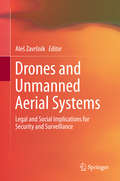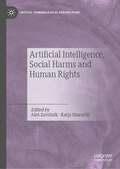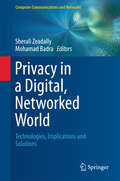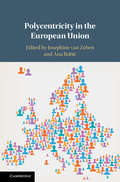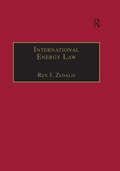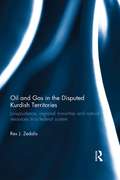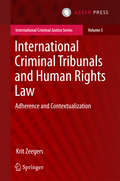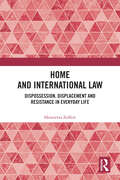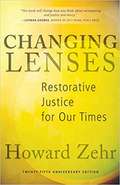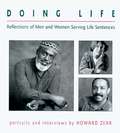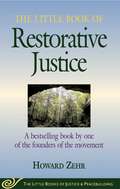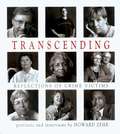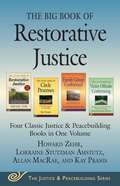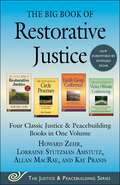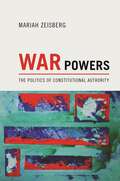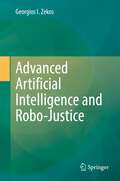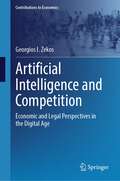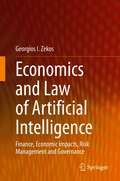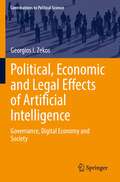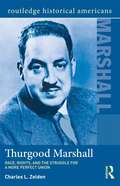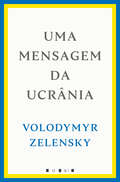- Table View
- List View
Drones and Unmanned Aerial Systems
by Aleš ZavršnikThis book tackles the regulatory issues of Unmanned Aerial Systems (UAS) or Remotely-Piloted Aerial Systems (RPAS), which have profound consequences for privacy, security and other fundamental liberties. Collectively known as "drones," they were initially deployed for military purposes: reconnaissance, surveillance and extrajudicial executions. Today, we are witnessing a growth of their use into the civilian and humanitarian domain. They are increasingly used for goals as diverse as news gathering, aerial inspection of oil refinery flare stacks, mapping of the Amazonian rain-forest, crop spraying and search and rescue operations. The civil use of drones is becoming a reality in the European Union and in the US. The drone revolution may be a new technological revolution. Proliferation of the next generation of "recreational" drones show how drones will be sold as any other consumer item. The cultural perception of the technology is shifting, as drones are increasingly being used for humanitarian activities, on one hand, but they can also firmly be situated in the prevailing modes of postmodern governance on the other hand. This work will be of interest to researchers in Criminology and Criminal Justice interested in issues related to surveillance, security, privacy, and technology. It will also provide a criminological background for related legal issues, such as privacy law, aviation law, international criminal law, and comparative law.
Artificial Intelligence, Social Harms and Human Rights (Critical Criminological Perspectives)
by Aleš Završnik Katja SimončičThis book critically explores how and to what extent artificial intelligence (AI) can infringe human rights and/or lead to socially harmful consequences and how to avoid these. The European Union has outlined how it will use big data, machine learning, and AI to tackle a number of inherently social problems, including poverty, climate change, social inequality and criminality. The contributors of this book argue that the developments in AI must take place in an appropriate legal and ethical framework and they make recommendations to ensure that harm and human rights violations are avoided. The book is split into two parts: the first addresses human rights violations and harms that may occur in relation to AI in different domains (e.g. border control, surveillance, facial recognition) and the second part offers recommendations to address these issues. It draws on interdisciplinary research and speaks to policy-makers and criminologists, sociologists, scholars in STS studies, security studies scholars and legal scholars.
Cambridge Studies In European Law And Policy: Gendering European Working Time Regimes
by Ania ZbyszewskaThe standard approach to regulating working hours rests on gendered assumptions about how paid and unpaid work ought to be divided. In this book, Ania Zbyszewska takes a feminist, socio-legal approach to evaluate whether the contemporary European working time regimes can support a more equal sharing of this work. Focusing on the legal and political developments surrounding the EU's Working Time Directive and the reforms of Poland's Labour Code, Zbyszewska reveals that both regimes retain this traditional gender bias, and suggests the reasons for its persistence. She employs a wide range of data sources and uses the Polish case to assess the EU influence over national policy discourse and regulation, with the broader transnational policy trends also considered. This book combines legal analysis with social and political science concepts to highlight law's constitutive role and relational dimensions, and to reflect on the relationship between discursive politics and legal action.
Privacy in a Digital, Networked World
by Sherali Zeadally Mohamad BadraThis comprehensive textbook/reference presents a focused review of the state of the art in privacy research, encompassing a range of diverse topics. The first book of its kind designed specifically to cater to courses on privacy, this authoritative volume provides technical, legal, and ethical perspectives on privacy issues from a global selection of renowned experts. Features: examines privacy issues relating to databases, P2P networks, big data technologies, social networks, and digital information networks; describes the challenges of addressing privacy concerns in various areas; reviews topics of privacy in electronic health systems, smart grid technology, vehicular ad-hoc networks, mobile devices, location-based systems, and crowdsourcing platforms; investigates approaches for protecting privacy in cloud applications; discusses the regulation of personal information disclosure and the privacy of individuals; presents the tools and the evidence to better understand consumers' privacy behaviors.
The Allocation of Regulatory Competence in the EU Emissions Trading Scheme
by Josephine Van ZebenThe European Union's Emissions Trading System (EU ETS) is the world's largest carbon trading market. This book offers a new perspective on the EU ETS as a multi-level governance regime, in which the regulatory process is composed of three distinct 'competences' - norm setting, implementation, and enforcement. Are these competences best combined in a single regulator at one level of government or would they be better allocated among a variety of regulators at different levels of government? The combined legal, economic, and political analysis in this book reveals that the actual allocation of competences within the EU ETS diverges from a hypothetical ideal allocation in important ways, and provides a political economy explanation for the existing allocation of norm setting, implementation and enforcement competences among various levels of European government.
Polycentricity in the European Union
by Josephine Van Zeben Ana BobićSupranational governance is being challenged by politicians and citizens around the EU as over-centralized and undemocratic. This book is premised on the idea that polycentric governance, developed by Vincent and Elinor Ostrom, is a fruitful place to start for addressing this challenge. Assessing the presence of, and potential for, polycentric governance within the EU means approaching established principles and practices from a new perspective. While the debate on these issues is rich, longstanding and interdisciplinary, it has proven difficult to sidestep the 'renationalisation/federalisation' dichotomy. The aim of this volume is not to reject the EU's institutional structure but provide a different benchmark for the assessment of its functioning. Polycentric theory highlights the importance of multilevel horizontal relationships within the EU - between states, but also between many sub-state actors, all the way down to individuals. This helps us answer the question: how do we achieve self-governance in an interdependent world?
International Energy Law: Rules Governing Future Exploration, Exploitation and Use of Renewable Resources
by Rex J. ZedalisThe international legal rules affecting renewable alternative energy resources are amongst the most important legal and environmental concerns of the near future. As traditional energy sources are depleted, new technologies are being developed to harness the potentials of wave, current and tidal energy, coastal wind power, offshore geothermal, polar energy resources and space-based solar collection. This book is the first comprehensive analysis of the legal rules governing the alternative energy resource potential of all international common areas - the high seas, the polar zones (especially Antarctica) and outer space. In a detailed, but precisely analyzed text, the book also reviews the international environmental rules affecting exploration, exploitation and use of internationally situated energy resources, alongside resources located offshore under national jurisdictions. This is accompanied by a critical look at the connection between efforts to control greenhouse gases and the growing interest in non-polluting alternatives found in the international "commons . The result is a work of unprecedented value for environmental and international law academics and practitioners, as well as those interested in environmental resource economics and politics.
The Legal Dimensions of Oil and Gas in Iraq
by Rex J. ZedalisThis volume presents the first and only comprehensive examination of the legal issues surrounding international debt recovery on claims against Iraqi oil and gas. In addition to presenting a snapshot view of Iraq's outstanding debt obligations and an analysis of the significance of the theory of odious debt in the context of the Iraqi situation, the list of legal issues examined includes relevant provisions of the Iraqi Constitution of 2005, controlling Security Council resolutions, pertinent articles of the KRG oil and gas law (No. 22) of 2007 and the many nuanced and technical questions raised thereby, legal pronouncements aimed at protecting Iraqi oil and gas and those adopted in selected other nations, and general problems associated with recognition and enforcement of awards or judgments that may involve such oil and gas or revenues from the sale thereof. Also discussed are the lessons learned by the handling of the Iraq debt experience and the transferability of those lessons to future situations in which resource-rich nations may have outstanding financial obligations to other members of the world community or their nationals.
Oil and Gas in the Disputed Kurdish Territories: Jurisprudence, Regional Minorities and Natural Resources in a Federal System
by Rex J. ZedalisThis book examines the historical and contextual background to the oil and gas resources in the Kurdish territories, placing particular emphasis on the reserves situated in the disputed provinces. The volume is singularly unique in focusing on an examination of the rules reflected in both the national and the regional constitutional, legislative, and contractual measures and documents relevant to the question of whether the central government in Baghdad or the Kurdish Regional Government (KRG) in Erbil has a stronger claim to legal control over the oil and gas resources in the disputed Kurdish territories. As a subsidiary focus, the author also draws attention to how the basic thrust of the volume connects to broader jurisprudential issues regarding the nature and purpose of law, the matter of claims by native peoples to natural resources on traditional lands, and the place of regional minorities operating in a federal system. Since the law examined is domestic or municipal in origin, additional reference is made to the role that such law can play in the "bottom up" (as opposed to more conventional "top down") development of international law. The book’s opening chapters provide a valuable contextual introduction, followed by a number of substantive chapters providing an analytical and critical assessment of the controlling legal rules. Written in a scholarly, yet accessible style, and covering matters of basic importance to academics, lawyers, political scientists, government representatives, and students of energy and natural resources, as well as those of developing legal structures, Oil and Gas in the Disputed Kurdish Territories is an essential addition to any collection.
International Criminal Tribunals and Human Rights Law
by Krit ZeegersThis book addresses the interpretation and application of human rights norms by International Criminal Tribunals (ICTs). Such Tribunals are widely heralded as human rights defenders. At the same time, however, they employ activities that necessary entail the risk of human rights violations: they conduct criminal investigations, arrest and detain individuals, and put them on trial. This book investigates this flip-side of the ICTs' relationship with international human rights law, and focuses on the ICTs' own interpretation and application of human rights norms. First, the book addresses whether and how ICTs are bound by human rights law, since unlike states, they do not sign or ratify human rights conventions. Second, the book provides an in-depth analysis of the way in which ICTs interpret and apply human rights norms, compared to the way in which these norms are interpreted in a traditional state-context. Relying on the unique circumstances in which they operate, ICTs have often deviated from generally accepted interpretations of human rights. The author critically examines this so-called contextual approach and seeks to recommend ways in which ICTs can improve their interpretative practice by giving due regard to the context in which they operate, while still providing adequate human rights protection. Addressing the ICTs' possible leeway in terms of contextualization, this book contributes to the broader debates about adherence to human rights norms in international law. Krit Zeegers is an Associate at Allen & Overy LLP, Amsterdam, and previously worked as a researcher / junior lecturer at the University of Amsterdam.
Home and International Law: Dispossession, Displacement and Resistance in Everyday Life
by Henrietta ZeffertThis book is about home and international law. More specifically, it is about the profound, and frequently devastating, transformations of home that are happening almost everywhere in the world today and what international law has to do with them. Through three stories of home – the desert home, the lake home and the city home – this book traces how the everyday operations of international law shape the material, affective and imaginative experience of home. It argues that international law’s ‘homemaking work’ is characterised by acts of domination, practices of resistance and the production of unhomely spaces. However, the book also considers whether and how the liberatory potential of international law could be unlocked through the metaphor of home. This book draws from fieldwork conducted by the author in Palestine, Cambodia and the United Kingdom. It takes a global socio-legal approach to home and international law, informed by feminist political theory, feminist geography, home studies and contemporary critical approaches to international law. It is the first academic work to examine the relationship between home and international law. This book’s global socio-legal approach to home and international law will be of interest to those teaching and studying in international law, socio-legal studies, legal pluralism and legal geography.
Changing Lenses: Restorative Justice for Our Times
by Howard ZehrDoes the criminal justice system actually help victims and offenders? What does justice look like for those who have been harmed? For those who have done harm? Twenty-five years after it was first published, Changing Lenses by Howard Zehr remains the classic text of the restorative justice field. <P><P> Now with valuable author updates on the changing landscape of restorative justice and a new section of resources for practitioners and teachers, Changing Lenses offers a framework for understanding crime, injury, accountability, and healing from a restorative perspective. Uncovering widespread assumptions about crime, the courts, retributive justice, and the legal process, Changing Lenses offers provocative new paradigms and proven alternatives for public policy and judicial reform.
Doing Life: Reflections Of Men And Women Serving Life Sentences
by Howard Zehr<P> What does it mean to face a life prison sentence? What have "lifers" learned about life-from having taken a life? Photographer Howard Zehr has interviewed and made portraits of men and women in Pennsylvania prisons who are serving life sentences without possibility of parole. Readers see the prisoners as people, de-mystified. <P><P> Brief text accompanies each portrait, the voice of each prisoner speaking openly about the crime each has committed, the utter violation of another person each has caused. They speak of loneliness, missing their children growing up, dealing with the vacuum, caught between death and life. A timely book.
The Little Book of Restorative Justice: Revised and Updated (Justice and Peacebuilding)
by Howard ZehrHoward Zehr is the father of Restorative Justice and is known worldwide for his pioneering work in transforming understandings of justice. Here he proposes workable principles and practices for making Restorative Justice possible in this revised and updated edition of his bestselling, seminal book on the movement. (The original edition has sold more than 110,000 copies.)Restorative Justice, with its emphasis on identifying the justice needs of everyone involved in a crime, is a worldwide movement of growing influence that is helping victims and communities heal, while holding criminals accountable for their actions.This is not soft-on-crime, feel-good philosophy, but rather a concrete effort to bring justice and healing to everyone involved in a crime. In The Little Book of Restorative Justice, Zehr first explores how restorative justice is different from criminal justice. Then, before letting those appealing observations drift out of reach into theoretical space, Zehr presents Restorative Justice practices. Zehr undertakes a massive and complex subject and puts it in graspable from, without reducing or trivializing it.This resource is also suitable for academic classes and workshops, for conferences and trainings, as well as for the layperson interested in understanding this innovative and influential movement.
Transcending: Reflections Of Crime Victims
by Howard ZehrAre victims of crime destined to have the rest of their lives shaped by the crimes they've experienced? ("What happened to the road map for living the rest of my life?" asks a woman whose mother was murdered.) Will victims of crime always be bystanders in the justice system? ("We're having a problem forgiving the judge and the system," says the father of a young man killed in prison.) Is it possible for anyone to transcend such a comprehensively destructive, identity altering occurrence? ("I thought, I'm going to run until I'm not angry anymore," expresses a woman who was assaulted.) Howard Zehr presents the portraits and the courageous stories of 39 victims of violent crime in Transcending: Reflections of Crime Victims. Many of these people were twice-wounded: once at the hands of an assailant; the second time by the courts, where there is no legal provision for a victim's participation. "My hope," says Zehr, "is that this book might hand down a rope to others who have experienced such tragedies and traumas, and that it might allow all who read it to live on the healing edge."
The Big Book of Restorative Justice: Four Classic Justice & Peacebuilding Books in One Volume (Justice and Peacebuilding)
by Howard Zehr Allan Macrae Kay Pranis Lorraine AmstutzFor the first time, the four most popular restorative justice books in the Justice & Peacebuilding series—The Little Book of Restorative Justice: Revised and Updated, The Little Book of Victim Offender Conferencing, The Little Book of Family Group Conferences, and The Little Book of Circle Processes—are available in one affordable volume. Restorative justice, with its emphasis on identifying the justice needs of everyone involved in a crime, is a worldwide movement of growing influence that is helping victims and communities heal while holding criminals accountable for their actions. This is not a soft-on-crime, feel-good philosophy, but rather a concrete effort to bring justice and healing to everyone involved in a crime. Circle processes draw from the Native American tradition of gathering in a circle to solve problems as a community. Peacemaking circles are used in neighborhoods, in schools, in the workplace, and in social services to support victims of all kinds, resolve behavior problems, and create positive climates. Each book is written by a scholar at the forefront of these movements, making this important reading for classrooms, community leaders, and anyone involved with conflict resolution.
The Big Book of Restorative Justice: Four Classic Justice & Peacebuilding Books in One Volume (Justice and Peacebuilding)
by Howard Zehr Allan MacRae Kay Pranis Lorraine Stutzman AmstutzThe four most popular restorative justice books in the Justice & Peacebuilding series—The Little Book of Restorative Justice: Revised and Updated, The Little Book of Victim Offender Conferencing, The Little Book of Family Group Conferences, and The Little Book of Circle Processes—in one affordable volume. And now with a new foreword from Howard Zehr, one of the founders of restorative justice!Restorative justice, with its emphasis on identifying the justice needs of everyone involved in a crime, is a worldwide movement of growing influence that is helping victims and communities heal while holding criminals accountable for their actions. This is not a soft-on-crime, feel-good philosophy, but rather a concrete effort to bring justice and healing to everyone involved in a crime. Circle processes draw from the Native American tradition of gathering in a circle to solve problems as a community. Peacemaking circles are used in neighborhoods, in schools, in the workplace, and in social services to support victims of all kinds, resolve behavior problems, and create positive climates.Each book is written by a scholar at the forefront of these movements, making this important reading for classrooms, community leaders, and anyone involved with conflict resolution.
Dynamic Fair Dealing
by Martin Zeilinger Rosemary Coombe Darren WershlerDynamic Fair Dealing argues that only a dynamic, flexible, and equitable approach to cultural ownership can accommodate the astonishing range of ways that we create, circulate, manage, attribute, and make use of digital cultural objects.The Canadian legal tradition strives to balance the rights of copyright holders with public needs to engage with copyright protected material, but there is now a substantial gap between what people actually do with cultural forms and how the law understands those practices. Digital technologies continue to shape new forms of cultural production, circulation, and distribution that challenge both the practicality and the desirability of Canada's fair dealing provisions.Dynamic Fair Dealing presents a range of insightful and provocative essays that rethink our relationship to Canadian fair dealing policy. With contributions from scholars, activists, and artists from across disciplines, professions, and creative practices, this book explores the extent to which copyright has expanded into every facet of society and reveals how our capacities to actually deal fairly with cultural goods has suffered in the process. In order to drive conversations about the cultural worlds Canadians imagine, and the policy reforms we need to realize these visions, we need Dynamic Fair Dealing.
War Powers: The Politics of Constitutional Authority
by Mariah ZeisbergArmed interventions in Libya, Haiti, Iraq, Vietnam, and Korea challenged the US president and Congress with a core question of constitutional interpretation: does the president, or Congress, have constitutional authority to take the country to war? War Powers argues that the Constitution doesn't offer a single legal answer to that question. But its structure and values indicate a vision of a well-functioning constitutional politics, one that enables the branches of government themselves to generate good answers to this question for the circumstances of their own times. Mariah Zeisberg shows that what matters is not that the branches enact the same constitutional settlement for all conditions, but instead how well they bring their distinctive governing capacities to bear on their interpretive work in context. Because the branches legitimately approach constitutional questions in different ways, interpretive conflicts between them can sometimes indicate a successful rather than deficient interpretive politics. Zeisberg argues for a set of distinctive constitutional standards for evaluating the branches and their relationship to one another, and she demonstrates how observers and officials can use those standards to evaluate the branches' constitutional politics. With cases ranging from the Mexican War and World War II to the Cold War, Cuban Missile Crisis, and Iran-Contra scandal, War Powers reinterprets central controversies of war powers scholarship and advances a new way of evaluating the constitutional behavior of officials outside of the judiciary.
Advanced Artificial Intelligence and Robo-Justice
by Georgios I. ZekosThe book deals with digital technology which is transforming the landscape of dispute resolution. It illustrates the application of AI in the legal field and shows the future prospect of robo-justice for an AAI society in the advanced artificial intelligence era. In other words, the present justice system and the influence of current AI upon courts and arbitration are investigated. The transforming role of AI on all legal fields is examined thoroughly by giving answers concerning AI legal personality and liability. The analysis shows that digital technology is generating an ever-growing number of disputes and at the same time is challenging the effectiveness and reach of traditional dispute resolution avenues. To that extent, the book presents in tandem the impact of AI upon courts and arbitration, and reveals the role of AAI in generating a new robo-justice system.Finally, the end of the perplexing relation of courts and arbitration is evidenced methodically and comprehensively.
Artificial Intelligence and Competition: Economic and Legal Perspectives in the Digital Age (Contributions to Economics)
by Georgios I. ZekosThis book examines the impact of artificial intelligence on competition and antitrust in today's global digital economy. It scrutinizes the economic and legal ramifications of Artificial Intelligence (AI), addressing the challenges it presents to competition and the law.Beginning with an analysis of AI's developments across various economic sectors, the book highlights the need for updated legislation. It focuses on the digital economy, emphasizing digital platforms' role in shaping competition. Econometric investigations and a novel index assess competition's influence on foreign direct investment and multinational enterprises. Comparing competition practices across jurisdictions like the EU, US, Germany, and China, the book uncovers commonalities and differences in competition law principles. It also explores various theories on competition and competition law, seeking convergence or divergence.This book is an essential resource for scholars, legal professionals, policymakers, and anyone seeking a better understanding of how AI is reshaping competition and antitrust in the digital age.
Economics and Law of Artificial Intelligence: Finance, Economic Impacts, Risk Management and Governance
by Georgios I. ZekosThis book presents a comprehensive analysis of the alterations and problems caused by new technologies in all fields of the global digital economy. The impact of artificial intelligence (AI) not only on law but also on economics is examined. In the first part, the economics of AI are explored, including topics such as e-globalization and digital economy, corporate governance, risk management, and risk development, followed by a quantitative econometric analysis which utilizes regressions stipulating the scale of the impact. In the second part, the author presents the law of AI, covering topics such as the law of electronic technology, legal issues, AI and intellectual property rights, and legalizing AI. Case studies from different countries are presented, as well as a specific analysis of international law and common law. This book is a must-read for scholars and students of law, economics, and business, as well as policy-makers and practitioners, interested in a better understanding of legal and economic aspects and issues of AI and how to deal with them.
Political, Economic and Legal Effects of Artificial Intelligence: Governance, Digital Economy and Society (Contributions to Political Science)
by Georgios I. ZekosThis book presents a comprehensive analysis of the alterations and problems caused by new technologies in all fields of politics. It further examines the impact of artificial intelligence (AI) on the nexus between politics, economics, and law. The book raises and answers several important questions: What is the role of AI in politics? Are people prepared for the challenges presented by technical developments? How will Al affect future politics and human society? How can politics and law deal with Al's disruptive technologies? What impact will AI and technology have on law? How can efficient cooperation between human beings and AI be shaped? Can artificial intelligence automate public decision-making?Topics discussed in the book include, but are not limited to digital governance, public administration, digital economy, corruption, democracy and voting, legal singularity, separation of power, constitutional rights, GDPR in politics, AI personhood, digital politics, cyberspace sovereignty, cyberspace transactions, and human rights. This book is a must-read for scholars and students of political science, law, and economics, as well as policy-makers and practitioners, interested in a better understanding of political, legal, and economic aspects and issues of AI.
Thurgood Marshall: Race, Rights, and the Struggle for a More Perfect Union
by Charles L. ZeldenThurgood Marshall was an Associate Justice of the US Supreme Court from 1967 to 1991. He was the first African American to hold that position, and was one of the most influential legal actors of his time. Before being appointed to the Supreme Court by President Lyndon Johnson, Marshall was a lawyer for the National Association for the Advancement of Colored People (NAACP), Federal Judge (1961-1965), and Solicitor General of the United States (1965-1966). Marshall won twenty-nine of thirty-two cases before the Supreme Court – most notably the landmark case of Brown v. Board of Education, which held segregated public schools unconstitutional. Marshall spent his career fighting racial segregation and legal inequality, and his time on the court establishing a record for supporting the "voiceless American." He left a legacy of change that still affects American society today. Through this concise biography, accompanied by primary sources that present Marshall in his own words, students will learn what Marshall did (and did not do) during his life, why those actions were important, and what effects his efforts had on the larger course of American history.
Uma Mensagem da Ucrânia
by Volodymyr ZelenskyAs palavras de um homem. A mensagem de um povo. Reunindo os mais poderosos discursos de guerra de Volodymyr Zelensky, e com uma introdução do próprio, este livro relata a história da Ucrânia através das palavras do seu presidente. É a história de uma nação que se defende com valentia da agressão da Rússia. E é a história de um povo que lidera o mundo na defesa da democracia. Acima de tudo, é um grito de guerra para que nos ergamos e lutemos pela liberdade. Se não for agora, quando o faremos?
